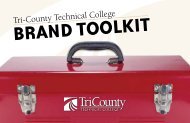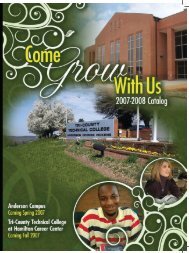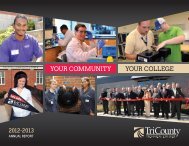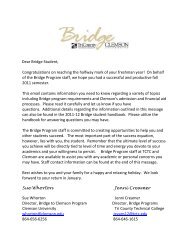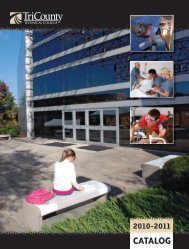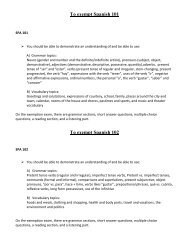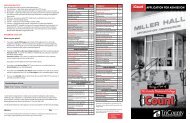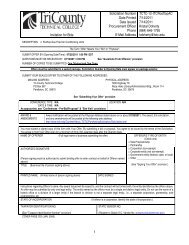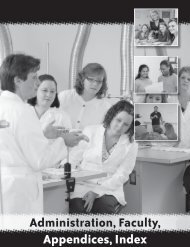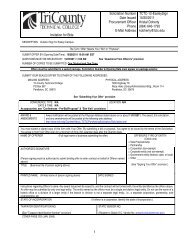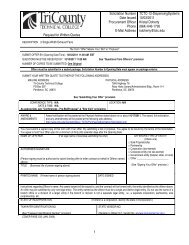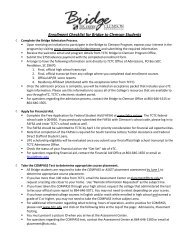TCTC Catalog - Tri-County Technical College
TCTC Catalog - Tri-County Technical College
TCTC Catalog - Tri-County Technical College
Create successful ePaper yourself
Turn your PDF publications into a flip-book with our unique Google optimized e-Paper software.
COURSE<br />
DESCRIPTIONS<br />
Course Descriptions<br />
production, news formatting and programming, and program<br />
assembly techniques.<br />
RTV 222 Television Studio Techniques (2-3-3)<br />
This course covers an introduction to TV production, including<br />
camera movements, directing instructions, editing and<br />
sequential photography in both linear and non-linear modes.<br />
RTV 223 Interviewing and Discussion (2-3-3)<br />
This course covers the techniques for successfully interviewing<br />
people, whether for TV sound bites or for full-length interview<br />
programs.<br />
RTV 242 Media Ethics (3-0-3)<br />
This course is a study of radio/television ethics and regulations.<br />
(RDG)—READING<br />
RDG 031 Developmental Reading (3-0-0)<br />
This course is designed for students who need additional<br />
instruction in basic reading skills and vocabulary development.<br />
Course content focuses on improving comprehension and concentration,<br />
developing a college-level vocabulary, and increasing<br />
reading speed. Students learn to recognize main ideas and<br />
supporting details, separate fact from opinion, make inferences,<br />
and draw conclusions.<br />
RDG 032 Critical Reading (3-0-0)<br />
This course is designed to enhance basic reading skills and to<br />
develop higher level vocabulary and comprehension skills, reading<br />
techniques, learning strategies, and higher level thinking<br />
skills needed for success in college-level courses. Students must<br />
satisfy appropriate exit level scores to complete this course<br />
successfully.<br />
(RES)—RESPIRATORY CARE<br />
TECHNOLOGY<br />
RES 101 Introduction to Respiratory Care (2-3-3)<br />
This course includes introduction topics pertinent to entering<br />
the respiratory care profession, i.e., medical terminology, ethical<br />
issues, and legal issues. It is an introduction to respiratory<br />
care to include basic therapeutic modalities such as physical<br />
assessment, humidity/aerosol therapy, medical gas therapy, infection<br />
control, and basic diagnostic procedures.<br />
RES 111 Pathophysiology (2-0-2)<br />
This course is a study of the general principles and analyses of<br />
normal and diseased states. This would include a basic knowledge<br />
of the etiology, diagnosis, pathophysiology, and treatment<br />
of acute and chronic pulmonary diseases.<br />
RES 121 Respiratory Skills I (3-3-4)<br />
This course includes a study of basic respiratory therapy<br />
procedures and their administration. This would include the<br />
rationale, physiologic effect, benefits, hazards, and side effects<br />
of each procedure. Modalities included are oxygen administration,<br />
aerosol therapy, incentive spirometry, CPT, and arterial sampling.<br />
RES 123 Cardiopulmonary Physiology (3-0-3)<br />
This course covers cardiopulmonary physiology and related<br />
systems. It is an in-depth study of the physiology of the cardiac<br />
and pulmonary systems that would include: cardiopulmonary<br />
anatomy, gas transport, gas exchange, ventilation, control of<br />
ventilation, the cardiac cycle and the electrophysiology of the<br />
heart.<br />
RES 131 Respiratory Skills II (3-3-4)<br />
This course is a study of selected respiratory care procedures<br />
and applications. The topics would include: hyperinflation<br />
therapy, artificial airways, suctioning, and an introduction to<br />
mechanical ventilation concepts.<br />
RES 141 Respiratory Skills III (2-3-3)<br />
This course covers mechanical ventilation systems, pediatrics<br />
and associated monitors. This would involve the set-up, monitoring,<br />
maintenance, and discontinuance of various mechanical<br />
ventilators.<br />
RES 142 Basic Pediatric Care (2-0-2)<br />
This course includes an introduction to basic pediatric and<br />
neonatal respiratory care. It introduces the special respiratory<br />
care needs of the pediatric patient. This would include assessment<br />
of the pediatric patient, differences in medications/<br />
dosages, modifications of therapy, and pathophysiology that is<br />
specific to the pediatric population.<br />
RES 151 Clinical Applications I (0-15-5)<br />
This course covers the fundamental respiratory care procedures<br />
in the hospital setting. It is designed to introduce the student<br />
to the hospital environment, physician’s office, and basic respiratory<br />
care modalities. This would include: oxygen administration,<br />
aerosol/humidity therapy, CPT, incentive spirometry,<br />
ABG analysis, patient assessment, charting, and equipment<br />
maintenance.<br />
RES 152 Clinical Applications II (0-9-3)<br />
The student will perform the basic respiratory care modalities<br />
from RES 151 with less supervision. The student will perform<br />
additional procedures under supervision to include: hyperinflation<br />
therapy, artificial airway maintenance, and the administration<br />
of basic modalities in the intensive care area. This course<br />
includes practice of respiratory care procedures in the hospital<br />
setting. Prerequisite: RES 151.<br />
RES 205 Neonatal Respiratory Care (2-0-2)<br />
This course focuses on cardiopulmonary physiology, pathology,<br />
and management of the newborn patient. This would include<br />
the application of respiratory care modalities, including<br />
mechanical ventilation, to the neonatal patient.<br />
RES 232 Respiratory Therapeutics (2-0-2)<br />
This course is a study of specialty areas in respiratory care,<br />
including rehabilitation. It also includes topics such<br />
as: pulmonary function testing, mechanical ventilation graphics,<br />
bronchoscopy, chest tube management, 12 lead EKG,<br />
capnography, and BiPAP.<br />
RES 236 Cardiopulmonary Diagnostics (2-3-3)<br />
This course focuses on the purpose, use, and evaluation of<br />
equipment/procedures used in the diagnosis and therapeutic<br />
management of patients with cardiopulmonary disease. This<br />
would include an in-depth study of hemodynamic monitoring<br />
and its relationship to respiratory care.<br />
115



